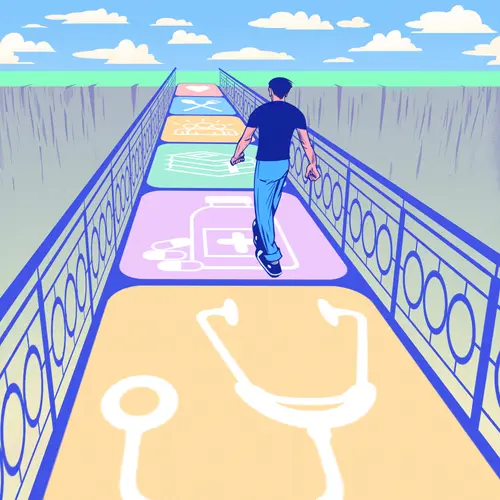Sick sinus syndrome (SSS) is a condition that gives you an abnormal heartbeat. It happens when your heart's natural pacemaker, the sinus node, no longer functions correctly. This results in abnormal heart rhythms.
Sick sinus syndrome can be the result of many different things. These include the aging process, certain medications, heart disease, or other conditions.
Types of Sick Sinus Syndrome
Sick sinus syndrome can include different types of heart rhythm problems including arrhythmias.
Sinus bradycardia. The average heart beats 60 to 100 times per minute. Someone with sinus bradycardia’s heart beats less than 60 times per minute. People like endurance athletes can have a heart rate lower than 60 which doesn't cause them any problems. But for most people that heart rate may be too low to pump oxygen-rich blood to the rest of the body.
Risk factors for bradycardia include coronary heart disease, diabetes, high blood pressure, heart valve disease, or cardiomyopathy.
Bradycardia-tachycardia. This is when you have alternating fast and slow heartbeats.
Sinus arrest or sinus pause. This is when the sinus node temporarily stops working or pauses, causing a change in the heart's beating.
Chronotropic incompetence. This is when your heart rate may be within regular range at rest but it doesn't increase as much as it should when you physically exert yourself as with exercise.
Causes of SSS
Many things can cause sick sinus syndrome. Sometimes they are beyond your control. Sometimes it can be hard or impossible even to discover the cause of SSS. Some of the most common causes are:
- Normal aging causes your heart tissue to wear naturally
- Heart disease
- Inflammatory diseases
- Scarring or damage from heart surgery
- Taking medications like beta-blockers, calcium channel blockers, or other high blood pressure medication
- Genetic mutations
- Sleep apnea
- Certain Alzheimer’s medications
Symptoms of Sick Sinus Syndrome
It can be difficult to know when you have sick sinus syndrome. Most people will not show any symptoms. Your symptoms may also be too weak to notice. When they do occur, SSS symptoms may include:
- Fatigue
- Dizziness
- Fainting
- Feeling out of breath
- Chest pain
- Confusion
- Slow pulse
- Heart palpitations
You should see your doctor if you think you have any of these symptoms. Treatment for the more severe causes of SSS needs to be timely. Sometimes treatment for sick sinus syndrome is as simple as changing medication. Seek treatment for a potential case of SSS sooner rather than later. Call 911 if you experience dizziness, fainting, chest pain, difficulty breathing, or confusion.
Diagnosing SSS
Your healthcare provider will likely order tests to rule out other conditions if they suspect that you have sick sinus syndrome. SSS can look a lot like many other diseases.
To make the diagnosis, your doctor or cardiologist will perform the following tests.
Electrocardiogram (ECG). An ECG test has a machine that records your heart’s electrical currents. Sometimes your doctor will have you do this while exercising to see your heart’s rhythm when your heartbeat is elevated.
Holter monitor. Your doctor may want to see what your heartbeat looks like over a longer period of time. They may ask you to wear a holter monitor for 24 hours or more.
Event monitor. Your doctor will ask you to wear an event monitor if your arrhythmia needs to be recorded for more than 24 hours.
Electrophysiology study (EPS). An EPS is another test that you might need. This test can map out the electrical impulses of your heart.
Preventing Sick Sinus Syndrome
The most common cause of sick sinus syndrome is natural aging. This type of SSS usually does not require any treatment and does not have any noticeable symptoms. Sick sinus syndrome is related to another illness in other cases.
It is best to be concerned with living a heart-healthy life generally rather than try to prevent SSS specifically. Some things you can do to help keep your heart healthy include:
- Quit or don’t start smoking.
- Manage high cholesterol and high blood pressure.
- Eat food that is low in cholesterol, sugar, and fat.
- Regularly exercise.
- Keep your BMI at a healthy number.
- Visit your doctor regularly.
Treating SSS
Treatment of sick sinus syndrome depends on what type of SSS and any other medical conditions you may have. The most common treatments are as follows.
Changing your medications. Sometimes your medications could be causing your arrhythmia. Simply consulting with your doctor and adjusting your health routine may take care of this problem.
Blood thinners. Your doctor may prescribe a blood thinner to decrease your risk of stroke if you have atrial fibrillation or some other arrhythmias.
Pacemaker. Most people with SSS will eventually need a pacemaker. A pacemaker is a device that is implanted under the skin near your collarbone to regulate your heartbeat.
Ablation. A procedure called an ablation may be needed to control certain rapid heart rhythms or to stop atrial fibrillation.

